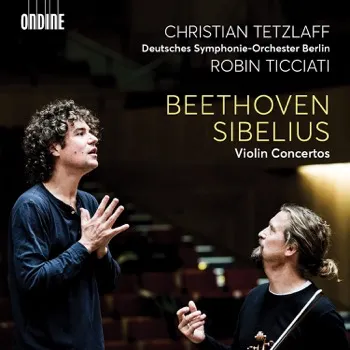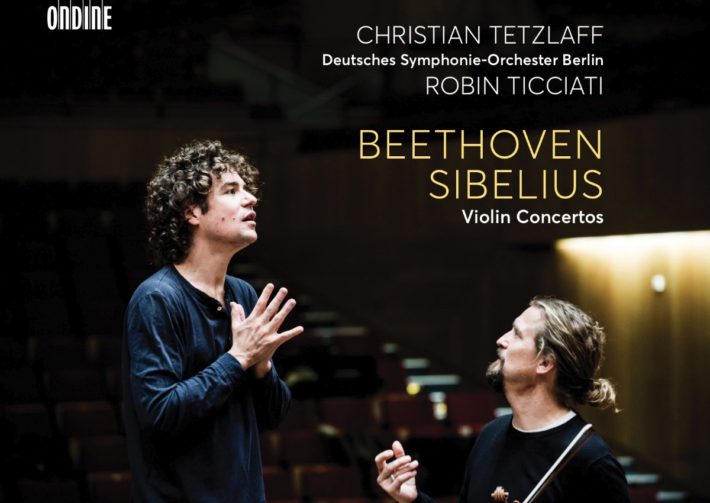Having recorded the concertos of Beethoven and Sibelius previously, now at the peak of his career, violinist Christian Tetzlaff returns to these two pinnacles of the repertoire. In this pairing for Ondine, Tetzlaff demonstrates how his artistry as a musician, poet and communicative artist have matured into something highly distinguished. Tetzlaff in these new recordings is paired with the Deutsches Symphonie-Orchester Berlin conducted by Robin Ticciati, who have bonded naturally to produce interpretations elevating these works to another level. Together they curate the most interesting path into the extraordinary emotions beneath the surface of the notes.

Tetzlaff’s earlier, well-respected rendition of Beethoven’s Violin Concerto with David Zinman and the Zürich Tonhalle Orchestra has a more vivacious feeling. Now a more muted opening movement evolves and grows, fully realizing the allegro ma non troppo indication. The exposition is paced and measured, the solo violin enters with a budding sound which grows organically out of the texture to bloom like a crimson rose. Tetzlaff’s tone has matured into the most exquisite sound, rich and luscious across the complete range. The cadenza, from the piano arrangement of the work, unfolds seamlessly into the coda as it maintains a dignified restraint.
The slow movement has a hushed intensity, magnified by hugely impressive dynamics from both Tetzlaff and the Deutsches Symphonie-Orchester, bringing a sense of intimacy. Throughout the quietest pianissimos, Tetzlaff’s tone is unwavering. Launching effortlessly into the final movement there is a measured momentum which becomes captivating. Only on reaching the end of the concerto do the tempo and dynamic choices all make sense, the climax in the final bars reveals the wholistic perspective Telzlaff has on this work. Throughout, there is a natural and judicious use of rubato which enhances the overall journey.
Like Tetzlaff, Nigel Kennedy and Isabelle Faust have each laid-down multiple recordings of this Concerto. Faust’s version with Orchestra Mozart under Claudio Abbado (2012) is a worthy comparison; A more extrovert rendition, with a brighter tone and in a slightly closer recording. Her slow movement is broader and works well in the more opulent acoustics.
Darkness and Melancholia
The Sibelius has an immediate presence — more muted than Tetzlaff’s previous rendition. This is chillier, airy and more ethereal, seeming to capture something of a panorama of the remoteness of Finnish lakes and forests. Both Ticciati and Tetzlaff are masters at bringing out the darkness and melancholia in this work. The episodes of the first movement have a unique character, incorporating subtle changes of hue which (like the Beethoven) feels part of a considered whole. The orchestral color of the second movement is vivid and mirrors Tetzlaff’s, while the finale is exciting, impressively navigating the emotional turbulence and contrasts with conviction. Tetzlaff’s technical prowess is flawless, never seeming stretched; his consistently beautiful tone, range of vibrato speeds and inherent lyricism are uncompromising.
Tetzlaff’s first Sibelius recording with Thomas Daussgaard and the Danish National Symphony Orchestra (2002) is slightly broader overall, but lacks the concentrated intensity of this new release. Lisa Batiashvili has also made two recordings, the latest, with Staatskapelle Berlin under Daniel Barenboim, is a highly commended performance which has attracted much attention. Tetzlaff’s certainly warrants the same praise.
At no point does Tetzlaff use these works as demonstrative vehicles for his own virtuosity. He treats them with the utmost respect, placing the music at the heart of the recording. The traditional liner notes are replaced with an insightful interview. This highly intelligent discussion reveals the context of his interpretative decisions with discernment and perception.
The Beethoven was captured live in November 2018, in the Philharmonie Berlin. A good recorded sound with minimal audience intrusion. The Sibelius follows on quite abruptly; a few seconds pause between the works would have been welcomed to give both works the space needed. Benefiting from studio conditions in Großer Sendesaal, Haus des Rundfunks (Berlin) in October 2018, the Sibelius has a marginally cleaner, slightly more balanced sound, allowing the fine orchestral details to be savored. A highly commendable and recommended release.
Beethoven – Violin Concerto, Op. 61
Sibelius – Violin Concerto Op. 47
Christian Tetzlaff – Violin
Deutsches Symphonie-Orchester Berlin
Robin Ticciati – Conductor
Ondine, CD ODE 1334-2




















